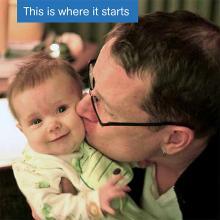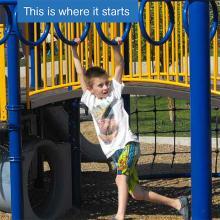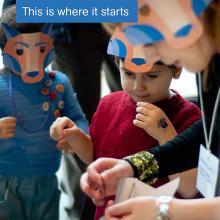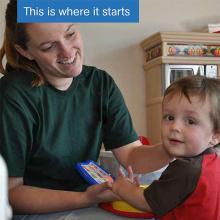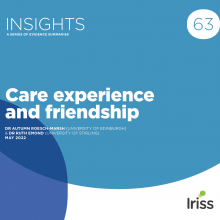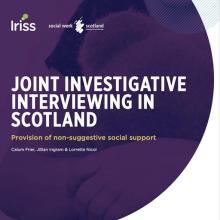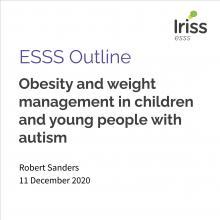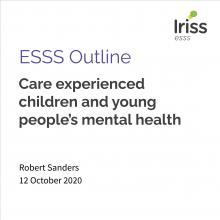Case study eight. This case study has been added to the This is Where it Starts case study collection, a collection of case studies on work with children and parents in early years. This case study has been written by Anne Condie, Head of Childminding Services, with support from Iriss.
Background
The Scottish Childminding Association's Community Childminding Service provides intervention for families at a time of crisis. The desired outcome is to prevent circumstances deteriorating and avoid a more substantial intervention being required. Families are referred for a variety of reasons from children with behavioural difficulties to a parent's mental illness.
Scottish Childminding Association (SCMA) provide training and local support to quality childminders, who in turn offer short-term placements to families in need, allowing children to remain looked after in their communities. The well-being of the child is paramount.
Childminders provide care based on the child's individual needs, helping them develop resilience and achieve crucial milestones. The Getting it Right For Every Child SHANARRI well-being indicators are used to map achievements and measure success.
The Service benefits children and families through short-term placements, typically lasting eight hours per week over six to 26 weeks. The majority of children cared for are in the 0-3 age bracket although the service can provide for children of any age.
Funding
SCMA currently has Community Childminding Services operating in various areas, supported by local authorities. The first service was founded through Sure Start funding. Most recently SCMA has successfully applied for the continuation of the Service in Fife, with match funding secured from Fife Council. This Service was previously funded through the Early Years Early Action fund and now has a grant secured through the Third Sector Early Intervention Fund.
Size and number of staff
- Supports over 300 families and over 400 children each year
- Operating in five local authority areas: Aberdeen City, Dumfries and Galloway, Fife, Scottish Borders and West Lothian
- Six Childminding Development Officers co-ordinate the services.
Referral routes
Statutory and third sector agencies, health, education and social work.
Established
The first service was established in Dumfries and Galloway in 2001. Since then SCMA has expanded provision. The Aberdeen City Service has been in existence since 2008. A small pilot was secured through the BIG Lottery's New Opportunities Fund. The local authority has continued to fund this on an increasingly larger scale to present. In November 2012 the service received funds to expand, to provide an additional 100 childcare places per annum over the next three years, through the Early Years Change Fund.
Key messages
A range of key outcomes have been identified from delivery of the service:
- Children have increased confidence
- Children have improved sleep/eating/toileting habits
- Children are able to engage more positively with peers and other child age groups
- Children are able to engage more positively with nursery and in social settings
- Parents have improved parenting skills.
Outcomes achieved
The children accessing the service have demonstrated: pronounced improvements in confidence, behaviour and social skills; growth in physical and emotional development. The parents have been supported to develop their parenting skills and the family as a whole have improved relationships and are better placed to engage within their communities (SCMA, 2013).
Supporting brain development
An important element of the service is the childminder setting, which can be one of the best methods of care provision for the very young child. The childminder becomes a significant adult who can provide the child with a strong emotional bond enabling them to form a secure attachment style fosters a child's socio-emotional development and well being. The childminder becomes part of the child's extended family, providing much needed support to vulnerable families. " Childminders were more emotionally responsive than centre-based providers when the children were ten and eighteen months old" (Leach, Barnes, Malmberg, Sylva and Stein, 2008). "By and large the parents interviewed in this study viewed nurseries as inappropriate for the very young child" (NCB Research Centre, 2013).
Universal service provision
Children and families receive non-stigmatised care in their own community. As the Service is not seen as formal intervention by the parents they engage easily with the childminder. The well-being of the child is paramount, the care and nurture provided centres on individual need and helps to develop resilience in children, enabling them to achieve crucial milestones. A holistic, enabling approach is taken to support families to develop resilience and parenting skills.
Offering early intervention prevents further escalation of problems
SCMA have found that using the Service as a form of early intervention can drastically reduce the need for more formal intervention to be required. This is evidenced in the Independent Review of Childminding, carried out by Dr Christine Stephens and Saran Minty of Stirling University. The review has been circulated at national level and used as evidence of the effectiveness of this type of service for early intervention and family support (Stephens and Minty, 2011). SCMA continue to develop and evaluate these services to help inform national policy.
Supporting families to function for the well-being of children and parents
The childcare placements offered by the Community Childminding Services give families time to deal with the difficulties they are facing, whilst providing one-to-one support for the children. The Service gives families a chance to focus on their issues and helps them successfully operate as a family unit once again.
The parents/carer also benefit as the childminder often acts as a non-judgmental role model in a non-threatening environment. They become better able to cope with challenging family circumstances, feel supported at a time of personal mental or physical ill-health and acquire helpful knowledge of parenting and childcare routines.
Increase parent's confidence and self-esteem
The influence on parenting should be highlighted as a secondary benefit, as parenting is critical to children's experience of early years and their life chances. The Community Childminders often become the parents' role models, providing non-judgemental support and guidance, enabling them to test-out and strengthen their parenting skills.
The experience a childminder has means they can often help parents work through any issues they are facing with their child. Perhaps the child has been diagnosed with an illness or has behavioural issues - the childminder can draw on their own experience and give support and guidance to the parents. This support from the childminder can increase a parent's confidence in their own ability. Evidence has been taken from the views of parents captured in the end of year report for the Early Years Early Action funded services in Fife and Stirling.
Bibliography
Leach, Barnes, Malmberg, Sylva and Stein, (2008) Leach, P., Barnes, J., Malmberg, L-E., Sylva, K., Stein, A., and the FCCC team (2008). The quality of different types of child care at 10 and 18 months: a comparison between types and factors related to quality. Early Child Development and Care, 178, 177-209.
NCB Research Centre (2013) The next best thing to being at home: Parents' views of quality in home-based childcare settings. Research Summary 10 February 2013. Rebecca Fauth, Sue Owen and Helena Jelicic, NCB
Stephens, C. and Minty, S. (2011) Review of SCMA Community Childminding and Working For Families Services (University of Stirling)
SCMA - Scottish Childminding Association (2013) Community childminding service. Evaluation report: Fife and Stirling
